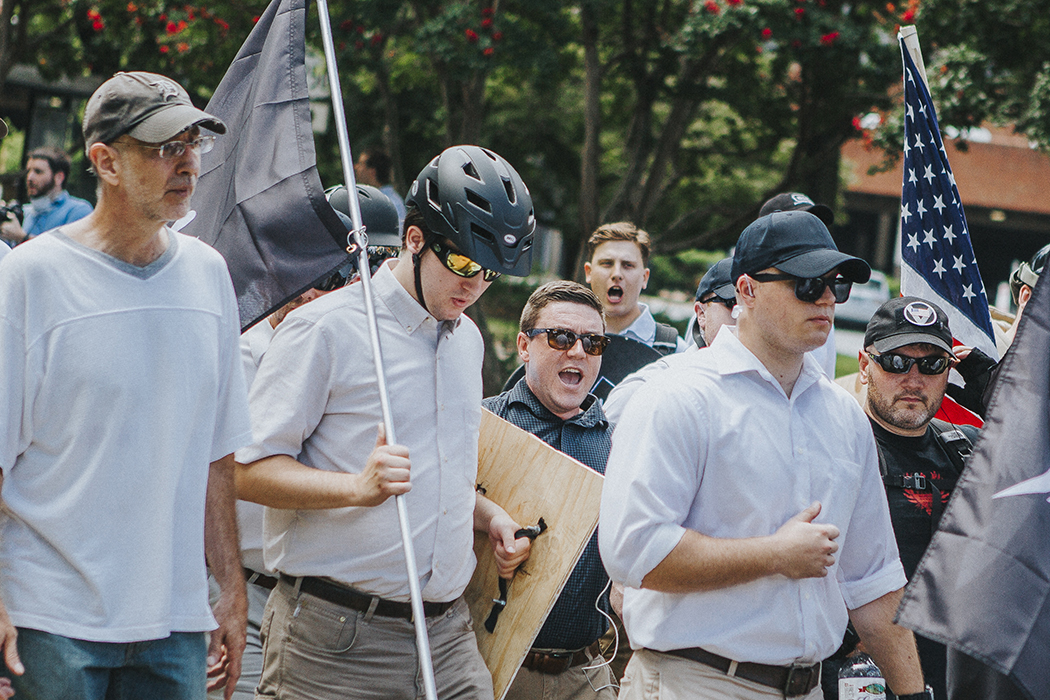Four years after white supremacists invaded Charlottesville for the Unite the Right rally, the biggest civil trial in federal court here starts October 25, and could last up to four weeks.
The case is Sines v. Kessler. Nonprofit Integrity First for America filed the complaint in October 2017 on behalf of victims of that violent August weekend. IFA’s strategy is simple: Make white nationalists and neo-Nazis pay for what the suit claims was a conspiracy to engage in racially motivated violence.
“It’s an incredibly ambitious case to bring justice,” says Heidi Beirich, co-founder of Global Project Against Hate and Extremism. “A big chunk of organized white supremacy is being sued. I can’t think of another anti-hate case of this magnitude.”
The number of people involved in the case is huge: nine plaintiffs—and their pro bono attorneys, two dozen defendants and their attorneys, jurors, witnesses, court staff, and security. Citing COVID safety, Judge Norman Moon has ordered that they’re the only people allowed in the courtroom during the trial.
Citizens who want to follow the trial are relegated to a live audio feed. Reporters who secure credentials will watch a live video feed from another room in the courthouse.
Plaintiff Elizabeth Sines was a second-year UVA law student who survived both the August 11 tiki-torch march through UVA Grounds and neo-Nazi James Fields plowing his Dodge Charger through a crowd of celebratory counterprotesters August 12, killing 32-year-old Heather Heyer and injuring dozens more.
Marcus Martin and fiancée Marissa Blair were on Fourth Street with their friend Heyer. Martin was captured suspended in mid-air in Ryan Kelly’s Pulitzer Prize-winning photo. So was Thomas Baker, a conservation biologist who still cannot stand for long periods of time without pain. Fields’ car also struck UVA student Natalie Romero and crisis counselor Chelsea Alvarado, and, like plaintiffs April Muniz and the Reverend Seth Wispelwey, they still suffer from extreme emotional distress, according to the complaint.
The trial originally was scheduled for 2019, but has been delayed because some defendants have flouted orders to produce evidence. A judge has granted default judgments against seven defendants, including Andrew Anglin, the neo-Nazi founder of The Daily Stormer. An arrest warrant has been issued for his colleague Robert “Azzmador” Ray, who has blown off every court order.
Also earning default judgments are the Nationalist Front; the East Coast Knights of the Ku Klux Klan; the Fraternal Order of the Alt-Knights, the military arm of the Proud Boys; FOAK leader Augustus Invictus; and the Loyal White Knights of the KKK, who protested in Charlottesville in July 2017.
The trial hasn’t started yet, but for the defendants, things are already falling apart.
The court has sanctioned Traditionalist Worker Party founder Matthew Heimbach, Unite the Right’s operations manager Elliott Kline, aka Eli Mosley, and neo-Nazi group Vanguard America and ordered them to pay the plaintiffs’ attorneys $41,000.
Wrote Judge Joel Hoppe, “For now it is enough to say that each Defendant disobeyed at least four separate orders to provide or permit discovery of materials within his control while the litigation slowed and everyone else’s costs piled up.”
Kline also was found in contempt and jailed last year. The plaintiffs won an adverse influence ruling against him, which means the jury will be instructed to assume that allegations the defendants “formed a conspiracy to commit the racial violence that led to the Plaintiffs’ varied injuries” are plausible, according to a court document.
The same ruling has been made against Azzmador Ray and the National Socialist Movement, and the plaintiffs are asking for adverse inference against Heimbach.
Some lawyers representing defendants have asked to be released because of nonpayment or failure to produce evidence, or have cited their client’s “repugnant” behavior in the case of Chris Cantwell, who threatened the plaintiffs’ lead attorney Roberta Kaplan.
Cincinnati attorney James Kolenich is listed on court documents representing a dozen defendants, but now his only clients are rally organizer Jason Kessler, Identity Evropa, and its founder, Nathan Damigo. Kolenich declined to comment about the case.
“Crying Nazi” Cantwell, who was ordered out of Virginia after pepper spraying counterprotesters at the Thomas Jefferson statue August 11 and currently is in prison for threating to rape the wife of a fellow white nationalist, will represent himself.
So will UVA grad Richard Spencer, who headed the National Policy Institute and was a poster boy for the alt-right. He told the court in June 2020 that the lawsuit was “financially crippling” and he can’t raise money because he’s been booted off so many platforms, according to IFA.
The suit is already having an impact, says Beirich. “Some of the groups sued are falling apart.” Spencer’s National Policy Institute is “basically defunct at this point,” she says. “Other groups like the League of the South have descended into infighting and ineffectiveness in the face of the lawsuit.”
Even Beirich, an expert in extremism for years with Southern Poverty Law Center, was shocked at the number of white supremacists who showed up in Charlottesville in August 2017. The suit is “bringing judgment for the victims of the biggest white supremacy rally in recent years,” she says.
“Sines v. Kessler basically said, ‘No, we are not going to let this continue,’” she says. “They’re holding so many different individuals and organizations, who orchestrated that horrible weekend in 2017 financially liable for their activities that caused so much great harm.”
